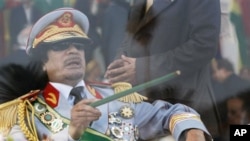Monday, the International Criminal Court issued arrest warrants for Libyan leader Moammar Ghadafi, his son and the head of the Libyan intelligence agency.
Mr. Ghadafi is the second sitting head of state indicted by the ICC. The first was Sudanese President Omar al-Bashir. Although indicted in 2008, Mr. Bashir is yet to be arrested.
For the victims
“It’s important to hold accountable those who commit atrocities, such as crimes against humanity. And there is reason to believe that these individuals…committed crimes against humanity. So, it’s important for those who do commit international crimes to be held accountable,” said David Crane, professor at Syracuse University School of Law and former chief prosecutor for the Special Court for Sierra Leone.
Crane added, “The bottom line is this is for justice for the victims.”
As with the case of Mr. Bashir, an indictment does not mean immediate prosecution.
“It highlights the role of politics in modern international criminal law. The legal aspects of making sure that Omar al-Bashir or Moammar Ghadafi receives a fair trial have been set in place. So now it’ll be a political decision to hand over Bashir and eventually Moammar Ghadafi,” he said.
Security Council vs. national government
Is there a difference between a case referred to the ICC by the U.N. Security Council and one referred by an African government, for example?
Crane said, “Legally, I don’t think it makes much difference at all because all those actions do is provide the jurisdiction by which the prosecutor can look into the allegations and then make recommendations to the court.”
But here politics may also play a role.
“From a political point of view, when the U.N. Security Council refers a matter to the court, for whatever reason, I think it adds a little bit of a political twist to the issue. The international community represented by the Security Council finds that the actions that have taken place here are the gravest of crimes that need to be carefully looked into. So even though it’s not a legal specificity, there’s a subtle aspect of this related to the politics,” he said.
Ocampo
The term of the ICC’s first chief prosecutor, Luis Moreno Ocampo, expires at the end of this year. He’s been on the job about nine years.
Crane describes him as “someone who had a lot on his plate. Not only setting up a court, but also setting up precedent. Everything he does is for the first time. I admire that. I was in that same position at the Special Court for Sierra Leone, being the founding chief prosecutor. But he is setting up a cornerstone by which for decades future chief prosecutors will be seeking justice for victims.”
He outlines the qualifications needed by the next ICC chief prosecutor.
“The chief prosecutor position is someone who is admired around the world. Someone who had leadership capabilities and management capabilities. Being a good lawyer, being a jurist of distinction is a given… I think the most important aspect of being a chief prosecutor is not where you’re from… but your ability to inspire, to lead, to guide your team forward in making sure justice is done,” Crane said.




